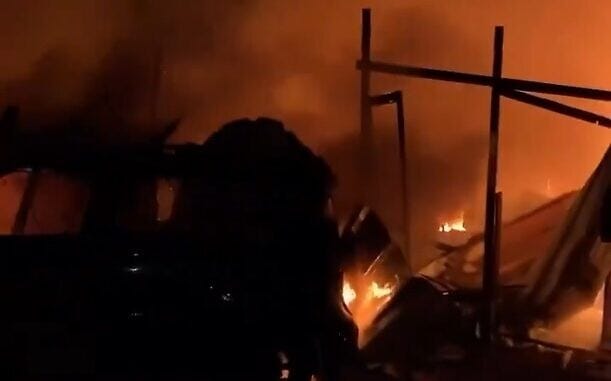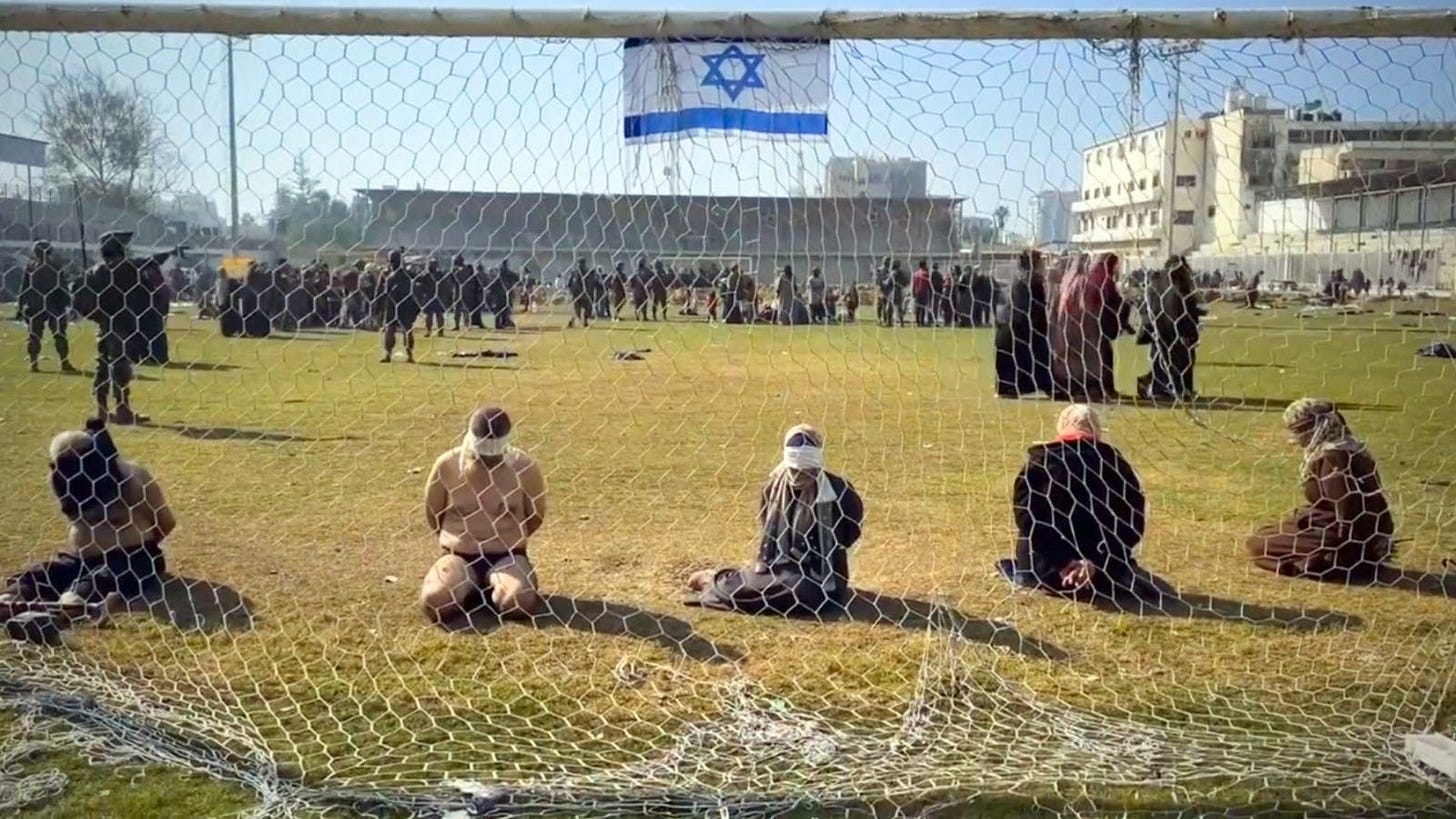When will it be enough?
How many Palestinian lives must be lost before FIFA & the IOC decide to intervene? What fresh horror is necessary for sports to align with the increasing demands for Israel to be held accountable?
Welcome to Sports Politika, a media platform focused on the intersection of sports, power and politics. This outlet was founded by investigative journalist and researcher Karim Zidan and relies on the support of readers like you.
Help support independent journalism by becoming a paid subscriber today.
It was Sunday night when images of the charred remains of Palestinians—most of whom were children—began to flood social media following an Israeli strike on a tent camp in Rafah, a city along Gaza’s southern edge that had been a refuge for half of the strip's 2.3 million people since the war broke out some nine months ago.
The images, too gruesome and disturbing to share or link to, were quickly verified, along with reports of at least 45 people killed and dozens more injured. Beyond the fact that it was an obvious war crime, it was a stain on humanity and international law—a moment deemed “hell on earth” by the UN agency for Palestinian refugees.
I was in Beirut visiting one of my oldest and dearest friends, whose work had transferred him from Cairo for a year-long stay in the Lebanese capital, when I first saw the sickening images. It is my first time visiting Lebanon, where tensions are high along the southern border with Israel.
From the moment you step out of the Rafik Hariri airport and make your way through the Shia-dominated suburb of Dahieh towards downtown Beirut, your eyes are inundated with political slogans and images of Hassan Nasrallah, the Lebanese cleric in charge of the infamous Shia Islamist political party and militant group Hezbollah, Iran’s recently deceased hardline president Ebrahim Raisi, and billboards carrying slogans like “Al Quds (Arabic for Jerusalem) is our eternal capital.” Yet once outside the Shia stronghold, the war appears to be nothing more than an afterthought—a distant nuance occurring a few hours south of the capital. Few seemed interested in discussing the subject.
Meanwhile, the situation could not be more different in Cairo, with pedestrians donning keffiyehs and discussions frequently revolving around Palestine. I returned today to reports of two Egyptian soldiers killed following an exchange of fire with Israeli forces along the Rafah border. This, coupled with the images of the charred Palestinian bodies, is the current topic of conversation across the country.
The Egyptian sentiment is part of a chorus of worldwide condemnation facing Israel in the wake of the Sunday’s strike on Rafah, which occurred in an area that Israel had deemed a “safe zone” for displaced Gazans. This blatant disregard for international law, as well as audacious nature of such a strike following the International Court of Justice (ICJ) order directing Israel to halt its operation in Rafah and the rest of Gaza drew the ire of political leaders around the world. Ireland’s foreign minister described the attack as “barbaric”; Norway’s foreign minister called it a “material breach of the decision of the highest court of the world”; Jeremy Corbyn, the former leader of the UK Labour Party, labelled the attack a “monstrous failure of humanity.”
Despite the mounting international outcry against Israel’s ongoing destruction of Gaza, the world’s leading sports leagues and organizations remain silent. Some may question why their voices matter in this context, but the answer is clear: these organizations continue to welcome Israeli athletes and sports teams to their events, thereby normalizing Israel’s actions and providing its far-right government a crucial platform to exert soft power.
Prominent organizations and governing bodies such as FIFA, UEFA and the International Olympic Committee (IOC) have resisted growing calls for Israel to face sports sanctions. Just a few weeks ago, FIFA deferred a Palestinian motion calling for Israel to be sanctioned during the governing body’s annual congress—a decision that was taken following a successful lobbying campaign from Israel’s Football Association (IFA), which included letters to FIFA President Gianni Infantino and a speech during the congress calling for the depoliticization of sports.
"I believe football must be a key element of healing the fractures and the wounds, helping us to recover,” IFA president Shino Moshe Zuares said during the congress. "Yet once again we are facing a cynical, political and hostile attempt by the Palestinian association to harm Israeli football.”
Here is what I had to say about the subject at the time:
Zuares’ statement exemplifies how those with social and political privilege often advocate for the separation of sports and politics to suit their interests. In this instance, Israel—a country that has occupied Palestinian territories since 1967—is insisting that sports be used to distract from or normalize its treatment of Palestinians, rather than highlight the injustices resulting from years of occupation and dispossession.
Meanwhile, FIFA, which acted at record-speed to bar Russia from competitions after the country launched its invasion of Ukraine, is more than happy to embolden Israel’s actions by shielding it from consequences or condemnation.
FIFA’s failure to take decisive action in response to the PFA's motion highlights a glaring double standard and deepens the credibility crisis already facing the organization. With pressing issues such as the unreleased report on the 2022 World Cup in Qatar and a noticeable decline in transparency under Infantino’s leadership, FIFA’s commitment to accountability and justice remains in serious doubt. Until FIFA addresses these systemic issues and applies its principles consistently, its integrity will continue to be called into question.
FIFA’s inaction is especially troubling in the wake of Israeli war crimes committed on some of Gaza’s historic football stadiums. Yarmouk stadium was transformed into a makeshift internment camp for Palestinian detainees, where dozens of men, women and children were rounded up, stripped down to their underwear, and blindfolded, while the field itself was razed by tanks. Since then, all of Gaza’s football stadiums have been destroyed, while smaller fields have been used as makeshift displacement camps, and in at least one case, a mass grave.
Meanwhile, the IOC intends to permit Israeli athletes to compete at the Paris Games later this summer without any restrictions, including those currently serving in the Israeli Defense Force. This contrasts with their decision to deny eligibility to Russian and Belarusian athletes serving in the military due to the ongoing war in Ukraine.
By refraining from applying the same standards to Israel as they did to Russia, these sporting organizations appear to suggest that Palestine, as a member state and participant in major international events, is not deserving of the same level of sympathy, dignity, or the commitment required to uphold their fundamental human rights.
Last week, I appeared on The FootPol Podcast to discuss Israel’s war on Gaza and the role of sports in the conflict. During the conversation, I explained how sports can often be a reflection of society at large. While some prefer to view this in terms of romantic notions of unity and peace, the truth is that sports actually reflect the worst of our world: the corruption, the injustice, and the lack of humanity.
Therefore, I pose the following questions: how many Palestinian lives must be lost before FIFA and the IOC are prompted to intervene? What fresh horror or tragedy is necessary for sports leagues to align with the increasing demands for Israel to be held accountable for its actions?
When will it be enough?
Sports Politika is a newsletter about the intersection of sports, power and politics. If you like what you see, upgrade to a paid subscription ( or gift a subscription if you already have your own). We would appreciate if you could also like the post and let us know what you think in the comment section below.





Powerful piece..thank you for writing this
Great writing. Sports and all creativity should set itself a higher standard of humanity. That the IOC and Fifa capitulate to money and politics first mean they do not stand for Mankind.